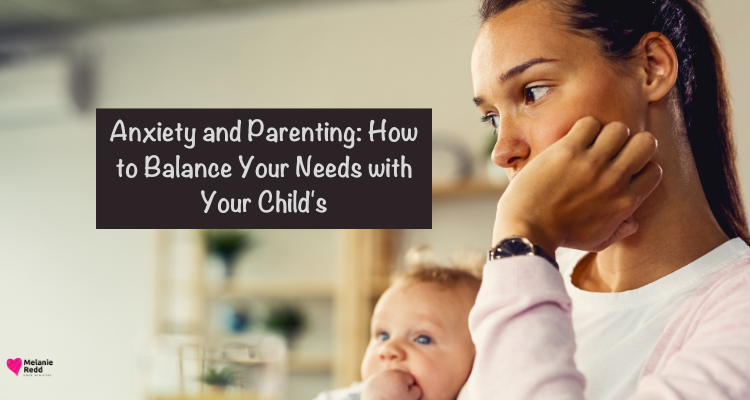Anxiety and Parenting: How to Balance Your Needs with Your Child’s

Anxiety and Parenting: How to Balance Your Needs with Your Child’s
Parenting is a rewarding yet demanding journey that often involves navigating emotional highs and lows. While joy and fulfillment are a constant, the stress and pressure of caring for a child—especially in today’s fast-paced world—can also lead to anxiety.
Short-term anxiety, in particular, is something many parents experience when immediate stressors, like a child’s tantrum, school issues, or health concerns, trigger intense feelings of worry and nervousness. The challenge is balancing your anxiety with the needs of your child so both you and your child can feel safe, heard, and understood.
If you’re struggling to manage short-term anxiety while parenting, you’re not alone. Here are some strategies to help you find balance and maintain your well-being while also meeting your child’s emotional needs.
Recognize and Acknowledge Your Anxiety
The first step in managing any form of anxiety is acknowledging its presence. Often, as parents, we become so focused on our children’s needs that we forget to address our emotional state. When you feel anxiety creeping in—whether it’s due to a difficult school situation, a child’s emotional outburst, or health concerns—recognize it without judgment.
Take a moment to pause, breathe, and assess what you’re feeling. Naming your emotions can be an incredibly grounding tool, as it allows you to better manage them rather than letting them spiral out of control. Remind yourself that it’s okay to feel anxious and that your feelings are valid. Parents are human, and it’s natural to experience anxiety when faced with difficult situations, especially when the well-being of your child is at stake.
Implement Immediate Coping Strategies
Once you recognize that you’re feeling anxious, it’s essential to have some immediate coping strategies in place. These can be small, quick actions that help you calm down at the moment, allowing you to shift focus back to your child’s needs.
- Deep Breathing: Slow, controlled breathing can help activate your parasympathetic nervous system, which is responsible for calming the body. Try taking a few deep breaths—inhale for a count of four, hold for four, and exhale for four. Doing this for a couple of minutes can quickly reduce your anxiety levels.
- Grounding Techniques: Another way to cope with short-term anxiety is to use grounding techniques. This can include simply noticing your environment—counting the number of items in the room, feeling the texture of a nearby object, or focusing on your feet as they touch the ground. Grounding can help you stay present, interrupting your anxious thoughts.
- Positive Self-Talk: When anxiety sets in, negative thoughts often follow. Reframe these thoughts with positive affirmations. Instead of thinking, “I’m failing at parenting,” try, “I’m doing the best I can in this moment.” Reassuring yourself with kindness can prevent anxiety from taking over.
Be Honest With Your Child (Without Overloading Them)
While it’s crucial to attend to your own emotional needs, it’s equally important to acknowledge your child’s needs. However, that doesn’t mean you have to suppress your feelings or pretend that everything is fine. Children are perceptive and can often sense when something is wrong. It can be beneficial to express your emotions in an age-appropriate way, letting your child know that you’re having a tough time but reassuring them that everything will be okay.
For example, you might say, “I’m feeling a little nervous right now because I want everything to go well for you, but we’re going to get through this together.” This not only helps your child understand that it’s okay to feel anxious sometimes, but it also models healthy emotional expression and problem-solving.
Set Boundaries for Self-Care
As a parent, it’s easy to get caught up in the whirlwind of your child’s needs, leaving your self-care at the bottom of the to-do list. However, it’s crucial to prioritize your well-being to be the best version of yourself for your child.
Setting boundaries is key to managing your anxiety and maintaining a healthy relationship with your child. This doesn’t mean ignoring your child’s needs but rather recognizing when you need a break or time to recharge. For example, if you’re feeling overwhelmed, let your child know that you need a few minutes of quiet time to collect your thoughts. You might say, “I need a break right now to calm down, and then I’ll be able to give you my full attention.” This not only sets healthy boundaries but also reinforces the idea that taking care of yourself is essential to being there for others.
Seek Support
Parenting doesn’t have to be done alone. If short-term anxiety is becoming a recurring issue, it may be time to seek support from others. Whether it’s talking to a partner, a friend, or a therapist, sharing your feelings can provide much-needed relief and perspective. Sometimes, just verbalizing your anxiety can lighten the emotional load.
Additionally, consider joining parenting support groups where you can connect with others who may be experiencing similar struggles. Knowing that you’re not alone in your challenges can be reassuring, and learning how others cope with anxiety can give you new tools for managing your own.
Practice Patience With Yourself – Anxiety and Parenting: How to Balance Your Needs with Your Child’s
Parenting is a rewarding yet demanding journey that often involves navigating emotional highs and lows. While joy and fulfillment are a constant, the stress and pressure of caring for a child—especially in today’s fast-paced world—can also lead to anxiety.
Even more, short-term anxiety, in particular, is something many parents experience when immediate stressors, like a child’s tantrum, school issues, or health concerns, trigger intense feelings of worry and nervousness. The challenge is balancing your anxiety with the needs of your child so both you and your child can feel safe, heard, and understood.
If you’re struggling to manage short-term anxiety while parenting, you’re not alone. Here are some strategies to help you find balance and maintain your well-being while also meeting your child’s emotional needs.
Anxiety and Parenting: How to Balance Your Needs with Your Child’s




0 Comments